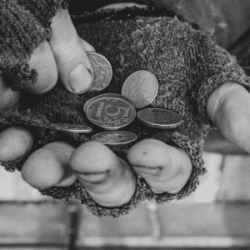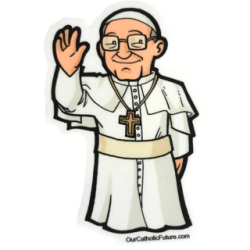Jesus' "family" of disciples began their journey of faith as common people -- as fishermen, internal revenue agents, housekeepers, farm laborers, or tradespeople. They listened to this prophet because his words about the kingdom of God touched their heart. They followed him because he was a faith healer and because he had an original message. They found themselves drawn to him and were invited by him to be part of a family of disciples. This, however, was only the beginning. As his disciples and apostles, their religious ideas and their lives were changed. He demanded of them a total commitment to God's kingdom as something already present and ongoing, ultimately as something that was happening then and there.
Our Own Story
Mark records all of this as a series of stages that we too can experience. We can find ourselves on the same journey. Our vocation began before we realized it, when we were still part of an anonymous (Christian) crowd that followed Jesus because his teaching was revelation and because he manifested authority. Our personal mission began perhaps when we received first communion or confirmation or the sacrament of marriage, or perhaps when we first asked ourselves what it means to be a Christian. We began consciously to use our talents and gifts to construct a future -- a future that depended on us and on God's help.
The power and authority Jesus was giving us was perhaps only dimly perceived because our path and our ideas were too much our own. We were filled with anguish and doubt. But gradually we became aware that another interpretation of our own experiences was possible. God through Jesus had already given us signs and visible proofs, like the bread Jesus miraculously gave the crowds. What we were doing was already our mission, made visible sacramentally through a church, where miraculous power and mystery are present, though not always seen. Frequent explanations heard in Scripture, or in religious education, or in preaching had already been telling us what God's "plan" for us was. But even more frequent discoveries were necessary to learn that there was an inner power and a spirit that gave life to what was only notionally assented to. We had to discover how we fitted into this plan, how our personal decision was a necessary part of it. Our real faith decision, just as Peter's, was made and pronounced with words which were beyond us, words which "flesh and blood" cannot speak, but only the Father in heaven.
Once our words -- of enthusiasm or balanced judgment -- were spoken, we still had to learn that this was only one half of our faith journey. There was still much to learn. We still had to place ourselves behind Jesus and to painfully ascend the road to Jerusalem, confident only that Jesus goes before us to prepare the way.
Many everyday problems, disputes, injustices, and doubts form part of this "road to Jerusalem" that cannot yet be seen as a road to victory, but can be accepted as part of our ongoing faith learning. Whatever our state of confidence or doubt, we can be followers of Jesus, of the one who has gone before us to face evil, injustice, doubt, and death. Our participation in his resurrection must begin with participation in his "earthly mission," which ends in Jerusalem, that is, in the City of God, the place where God will reveal his kingship. This revelation of God's rule over the world will no doubt be as paradoxical for us as it was for the Jews and for Jesus, for God's ways are not our ways. But the whole journey of faith that Mark sets down in stages fills us with hope and directs us to be attentive to what we are being taught -- not only the content of the teaching, but also the stage at which we find ourselves: whether as beginners, or as intermediate students who have grasped some things but have much to learn, or finally as those who have advanced far enough not to need any new lessons but only the application of what has already been learned and the assimilation of that into an ever deepening relationship with God.
This article was originally published at Spirituality Today and is reprinted with permission.
James V. Zeitz is an Associate Professor of Religious Studies and Theology at Our Lady of the Lake University in Texas.




